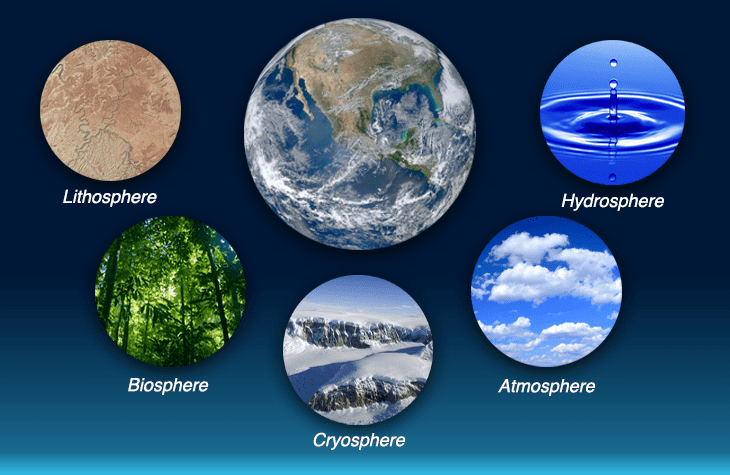Environmental Systems Science (SCIE 4104E)
This course focuses on Earth as a system and explores the interdependent relationships among the atmosphere, hydrosphere, biosphere and lithosphere. Through inquiry-based laboratories and field investigations students learn to take scientifically valid measurements in the fields of atmosphere, hydrology, soil and land cover/phenology. Students will gain experience in the analysis and mapping of scientific data, will design and investigate their own science inquiry, and present oral and written reports to their peers. The goal of this course is to provide an integrated background in earth system science and to become proficient at scientific practices including asking questions, developing and using models, planning and carrying out investigations, analyzing and interpreting data, using mathematics and computational thinking, constructing explanations, engaging argument from evidence, and obtaining, evaluating, and communicating information.
Required Materials: (1) Environmental Science: Foundations and Application, Author: Andrew J. Friedland, Publisher: W. H. Freeman, Edition: 1st, Year Published: 2011, ISBN: 978-1429240291 (2) GLOBE Program Teacher’s Guide, selected readings, science notebook, and clipboard.

Grading:
15% – Homework/Reaction paper (3)
15% – Quizzes (2)
15% – Mapping/Analysis (GIS) Projects (3)
20% – Research Group Project/Presentation (1)
25% – Final Exam (1)
10% – Participation in class discussions, field trips and experiments.
Homework/Reaction paperdue in 2 week
Quizzes: There will be two quizzes during the course. Quizzes will be multiple choice questions based on material taught during class. Each quiz will have 15 questions and to be solved in 20 min.GIS Projects: You will learn the basic use of ArcGIS software in the class. In the GIS projects you will creating maps based on environmental data (CO2 emission, Energy data, temperature, deforestation, etc.) provided to you.
Research Group Project: Under research group project activity each group will have 3-4 students. The project topic will be decided based on mutual discussion between group and instructor. Student will be using GIS software to produce maps for group project. The grading for this activity is based on final outcome of project (1) 5-6 page report and (2) PowerPoint presentation (9-10 slides).
Final Examination: Final exam will be mix of (1) multiple choice questions, (2) mathematical related problems, and (3) drawing charts/maps by hand.
Homework and final report format: All report must be submitted as hard copy in following format: Font should 11 point, Times New Roman, Single spaced lines, Justified, Page: Margin 1 inch all side, Bold Title and Sub-titles.
| Date | Presentation/Lecture (40-60 Min) | Homework / Quiz | Group activity/Audio/Video (40 min) | Experiment/ Projects (40 min) |
| 30-Jan | Course Overview, Introduction to the GLOBE program: What is GLOBE? | Hands-on Science Experiment 1: Measuring air and surface Temperature of objects | ||
| 6-Feb | Introduction to Environmental Systems Science, Atmosphere/climate, hydrology, Ecology, and alteration of air, soil and water | Homework 1: Read and analyze the article and write report | Video: IPCC – State of science IPCC – Fifth Assessment Report | Math Experiment 1: Use of min, max and average function using Global/regional dataset (1) Agriculture (2) CO2 |
| 13-Feb | Temperature: Measurements, Instruments (thermometer, satellite sensors), Calibration, protocol. | Group Activity 1: Discussion/ presentation: Earth Systems Concept (poster board) | Math Experiment 2: determine correlation coefficient and plotting using earth system data (1) Data1 (2) Data2 | |
| 20-Feb | Temperature: Trends, variability, global warming and mitigation | Video: IPCC – Climate change mitigation | Math Experiment 3: USA CO2 emission data to find trend and anomaly (1) Global CO2 Data, (2) USA data | |
| 27-Feb | Hydrology: Rainfall, Soil moisture, and Evapotranspiration. Measurements by Probe, Models and Satellite Sensors, Applications. | Quiz 1 | Video: NASA-SMAP mission, Drought projection, California drought 2014-15. | Hands-on Science Experiment 2: Measuring rainfall, manual and tipping bucket measurement |
| 5-Mar | Atmosphere: Cloud Type, Cloud Cover, Wind speed/direction, Hurricanes, (ground/satellite/ Radar). | Homework 2: Report on “Inconvenient Truth” | Group Activity 2: Discussion/ on climate adaptations and Global Warming mitigation | Hands-on Science Experiment 3: Soil moisture determination using Hydrometer (Due to cold weather moved to next class) |
| 12-Mar | Water quality: Temperature, conductivity, turbidity, salinity, monitoring and measurements | Video: TED Talk: Water & future UN – Global water supply/crisis. | Math Experiment 4: Climate/environmental Data analysis and data projection | |
| 19-Mar | Ecosystem: Land use and Land Cover, Wetlands, Vegetation monitoring | GIS Project 3: Use of environment (energy) data in GIS for mapping | ||
| 26-Mar | No Class Scheduled | |||
| 2-Apr | Guest Lecture: Water sustainability | Quiz 2 | Group Activity 3: Discussion on developing climate science and adaptation education | |
| 9-Apr | Mapping (GIS): Introduction to basic use and analysis using ArcGIS for creating maps. | Homework 3: Climate adaptation | Video: GIS Application for earth science. | GIS Project 1: Explore Earth Science Resources and create map Data link |
| 16-Apr | Mapping (GIS): Use of environmental data for analyzing and creating graphs and maps, and importing satellite images. | GIS Project 2: Use of climate data to produce maps using GIS software | ||
| 30-Apr | Field experiment trip 1 (during Class hour): Water Quality experiment measurement of temperature, turbidity, salinity, pH, etc. | Meeting at 145st @Hudson river park for water quality sampling and measurement. (Location lap and direction map will be provided) | ||
| 7-May | * Work on Group research Project * Hands on Activity on Ecosystem and Earth Science | Hands-on Science Experiment 4: Vegetation (NDVI) measurement | ||
| 14-May | Group Research Project Presentation | Class will be divided in 2 groups and project will be assigned mid-semester, students will write report and present their research using PowerPoint slides. | ||
| 21 May | Final Examination | |||
